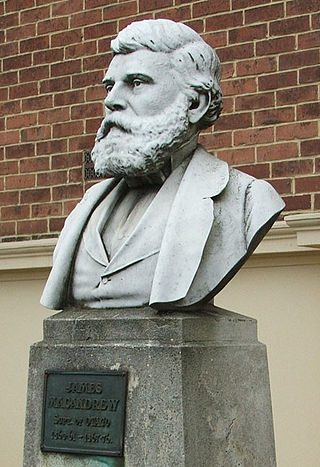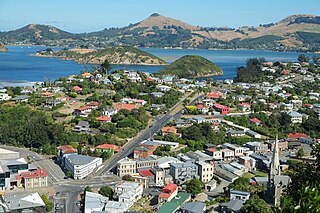Related Research Articles

Otago Harbour is the natural harbour of Dunedin, New Zealand, consisting of a long, much-indented stretch of generally navigable water separating the Otago Peninsula from the mainland. They join at its southwest end, 21 km (13 mi) from the harbour mouth. It is home to Dunedin's two port facilities, Port Chalmers and at Dunedin's wharf. The harbour has been of significant economic importance for approximately 700 years, as a sheltered harbour and fishery, then deep water port.

James Macandrew was a New Zealand ship-owner and politician. He served as a Member of Parliament from 1853 to 1887 and as the last Superintendent of Otago Province.

John Cargill was a New Zealand politician and runholder.

Port Chalmers is a town serving as the main port of the city of Dunedin, New Zealand. Port Chalmers lies ten kilometres inside Otago Harbour, some 15 kilometres northeast of Dunedin's city centre.

The Main South Line, sometimes referred to as part of the South Island Main Trunk Railway, is a railway line that runs north and south from Lyttelton in New Zealand through Christchurch and along the east coast of the South Island to Invercargill via Dunedin. It is one of the most important railway lines in New Zealand and was one of the first to be built, with construction commencing in the 1860s. At Christchurch, it connects with the Main North Line to Picton, the other part of the South Island Main Trunk.

Thomas Dick was a 19th-century New Zealand politician. Originally a merchant, he worked in London and then represented his firm on Saint Helena for seven years. From there, he was sent to Dunedin as the company's representative; he emigrated with an extended family. He soon became involved in politics and was Superintendent of Otago Province from 1865 until 1867. Over a period of 24 years, he represented various Dunedin electorates in Parliament and was Colonial Secretary (1880–1884), Minister of Justice from 1881 to 1882, and Minister of Education from 1881 to 1884. A deeply religious man, he was involved in many church affairs. He was one of the founders of Hanover Street Baptist Church; the building is now classified as Category I by Heritage New Zealand.
Clutha was a New Zealand parliamentary electorate from 1866 to 1996.
Chalmers, originally Port Chalmers, was a parliamentary electorate in the Otago Region of New Zealand, from 1866 to 1938 with a break from 1896 to 1902. It was named after the town of Port Chalmers, the main port of Dunedin and Otago.
Waikouaiti was a parliamentary electorate in the Otago region of New Zealand, from 1866 to 1908.

William Hunter Reynolds was a 19th-century businessman and Member of Parliament in Dunedin, Otago region, New Zealand. He was a cabinet minister. He is the only person who held membership on the Otago Provincial Council over the entire course of its existence (1853–1876), was Speaker of the council for three years, and was a member of the council's executive eight times.
City of Dunedin, during the first two parliaments called Town of Dunedin, was a parliamentary electorate in Dunedin in Otago, New Zealand. It was one of the original electorates created in 1853 and existed, with two breaks, until 1905. The first break, from 1862 to 1866, was caused by an influx of people through the Otago Gold Rush, when many new electorates were formed in Otago. The second break occurred from 1881 to 1890. It was the only New Zealand electorate that was created as a single-member, two-member and three member electorate.
Dunedin and Suburbs North was a parliamentary electorate in the city of Dunedin in Otago, New Zealand from 1863 to 1866. It was a multi-member electorate.
Dunedin and Suburbs South was a parliamentary electorate in the city of Dunedin in Otago, New Zealand from 1862 to 1866. From 1863 it was a multi-member electorate.
The 4th New Zealand Parliament was a term of the Parliament of New Zealand.
David Forsyth Main was a 19th-century member of parliament in Otago, New Zealand.
George Hepburn was a 19th-century Member of Parliament from Otago, New Zealand. Born in Scotland he emigrated to New Zealand in 1850. He first entered politics by serving on the Provincial Council of Otago from 1855 to 1865 before he was elected to the New Zealand House of Representatives as member for Roslyn in 1866.
Henry Hirst was a 19th-century Member of Parliament from Southland, New Zealand.
The New Zealand Constitution Act 1852 authorised the General Assembly to establish new electoral districts and to alter the boundaries of, or abolish, existing districts whenever this was deemed necessary. The rapid growth of New Zealand's European population in the early years of representative government meant changes to electoral districts were implemented frequently, both at general elections, and on four occasions as supplementary elections within the lifetime of a parliament.
Matoaka was a 1092-ton wooden New Brunswick full-rigged ship built in 1853 for Willis, Gunn, & Co. She was sold to Shaw, Savill, & Albion by 1859. Between 1859 and 1869 she made eight voyages to New Zealand. Her fastest run from Bristol to Lyttelton, New Zealand was 82 days in 1862. On 13 May 1869 she left Lyttelton for London under Captain Alfred Stevens with 45 passengers and 32 crew but was never seen again. In 1865 she was classed as 1322 tons.
The 1867 Port Chalmers by-election was a by-election held on 15 June 1867 in the Port Chalmers electorate during the 4th New Zealand Parliament.
References
- ↑ "Telegraphic Despatches". Southland Times. 19 November 1866.
- ↑ "Port Chalmers Election". Lyttelton Times. 22 December 1867.
- ↑ "Southern Opinions". Daily Southern Cross. 29 October 1866.
- ↑ "Mr Dick .. speech to constituents". Colonist. 6 November 1866.
- ↑ "Port Chalmers Election". Otago Witness. 22 December 1867.
- ↑ "Dunedin". Timaru Herald. 19 December 1867.